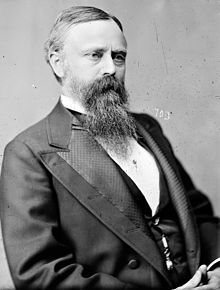John F. Philips
| John Finis Philips | |
|---|---|
 |
|
| Member of the U.S. House of Representatives from Missouri's 7th district |
|
|
In office 1875–1877 |
|
| Preceded by | Thomas Theodore Crittenden |
| Succeeded by | Thomas Theodore Crittenden |
| Member of the U.S. House of Representatives from Missouri's 7th district |
|
|
In office 1880–1881 |
|
| Preceded by | Alfred M. Lay |
| Succeeded by | Theron M. Rice |
| Judge of the United States District Court for the Western District of Missouri | |
|
In office 1888–1910 |
|
| Nominated by | Grover Cleveland |
| Preceded by | Arnold Krekel |
| Succeeded by | Arba Seymour Van Valkenburgh |
| Personal details | |
| Born |
December 31, 1834 Thralls Prairie, Boone County, Missouri, U.S. |
| Died | March 13, 1919 (aged 84) Hot Springs, Arkansas, U.S. |
| Resting place | Mount Washington Cemetery, Independence, Missouri, U.S. |
| Political party | Democratic |
| Alma mater | Centre College |
John Finis Philips (December 31, 1834 – March 13, 1919) was a lawyer, a cavalry colonel, a U.S. Representative from Missouri, and a judge.
Born in Thralls Prairie, Boone County, Missouri, Philips attended the common schools, the University of Missouri, and graduated from Centre College in Danville, Kentucky in 1855. He studied law, was admitted to the bar in 1857 and commenced practice in Georgetown, Missouri.
Philips served as member of the Missouri Constitutional Convention in 1861. During the Civil War, he was commissioned colonel May 1, 1862 and commanded the 7th Missouri State Militia Cavalry. During the Battle of Westport he was placed in command of a brigade when his superior, Brig. Gen. Egbert Brown, was placed under arrest by Maj. Gen. Alfred Pleasanton for not promptly attacking at Byram's Ford. Continuing in command after having taken the ford, Philips' brigade played a key role in the crushing victory at Mine Creek two days later. According to his diary he suffered an irritating wound to his right eye during the battle.
Following the war he resumed the practice of his profession at Sedalia, Missouri. He served as mayor and later as delegate to the Democratic National Convention in 1868. He was an unsuccessful candidate for election in 1868 to the Forty-first Congress.
Philips was elected as a Democrat to the Forty-fourth Congress (March 4, 1875 – March 3, 1877).
Philips was elected to the Forty-sixth Congress to fill the vacancy caused by the death of Alfred M. Lay and served from January 10, 1880, to March 3, 1881. He was an unsuccessful candidate for reelection in 1880 to the Forty-seventh Congress.
...
Wikipedia
